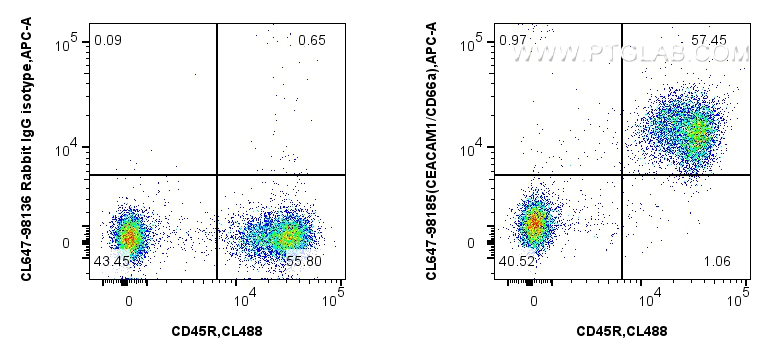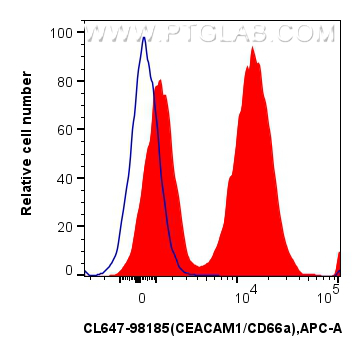验证数据展示
经过测试的应用
| Positive FC detected in | mouse splenocytes |
推荐稀释比
| 应用 | 推荐稀释比 |
|---|---|
| This reagent has been tested for flow cytometric analysis. It is recommended that this reagent should be titrated in each testing system to obtain optimal results. | |
| Sample-dependent, Check data in validation data gallery. | |
产品信息
CL647-98185 targets CEACAM1/CD66a in applications and shows reactivity with mouse samples.
| 经测试应用 | FC Application Description |
| 经测试反应性 | mouse |
| 免疫原 | Recombinant protein 种属同源性预测 |
| 宿主/亚型 | Rabbit / IgG |
| 抗体类别 | Recombinant |
| 产品类型 | Antibody |
| 全称 | carcinoembryonic antigen-related cell adhesion molecule 1 |
| 别名 | |
| 计算分子量 | 57 kDa |
| 基因名称 | Ceacam1 |
| Gene ID (NCBI) | 26365 |
| 偶联类型 | CoraLite® Plus 647 Fluorescent Dye |
| 最大激发/发射波长 | 654 nm / 674 nm |
| 形式 | Liquid |
| 纯化方式 | Protein A purification |
| UNIPROT ID | P31809-1 |
| 储存缓冲液 | PBS with 0.09% sodium azide , pH 7.3 |
| 储存条件 | Store at 2-8°C. Avoid exposure to light. Stable for one year after shipment. |
背景介绍
CEACAM1, also known as CD66a or BGP (biliary glycoprotein), is a member of the cacinoembryonic antigen (CEA) family which belongs to the immunoglobulin superfamily of cell adhesion molecules (PMID: 16919437). CEACAMs play major roles in cell-cell and cell-ECM adhesion and have been implicated in the control of cell proliferation, angiogenesis, and tissue remodeling (PMID: 23021083). CEACAM1 is a transmembrane glycoprotein that is expressed on epithelial, endothelial, and immune cells (PMID: 30314283). CEACAM1 has been demonstrated to play a role in morphogenesis, apoptosis, angiogenesis, cell proliferation, cell motility, fibrosis, and immunity (PMID: 31604530).
实验方案
| Product Specific Protocols | |
|---|---|
| FC protocol for CL Plus 647 CEACAM1/CD66a antibody CL647-98185 | Download protocol |
| Standard Protocols | |
|---|---|
| Click here to view our Standard Protocols |

